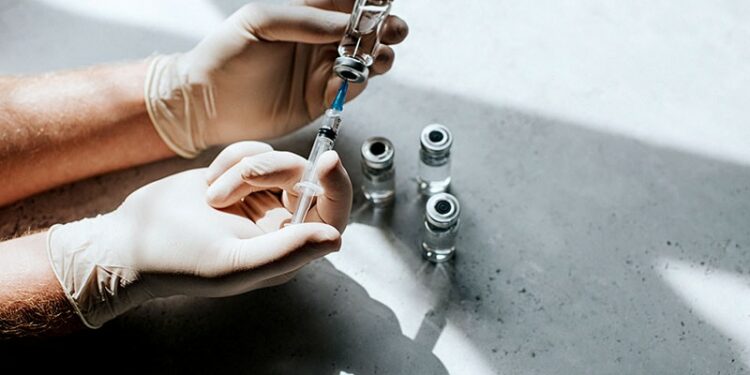[ad_1]
How long will vaccine protection last? A simple blood test may have the answer. Researchers at Stanford School of Medicine, Stanford, California, have identified a molecular signature in the blood that appears days after vaccination and predicts the durability of the immune response. Published in Nature Immunology in January, this discovery could transform vaccine development, testing, and personalization of vaccines. The study also offers insights into why some vaccines provide lifelong immunity while others lose effectiveness within months.
Vaccine Durability
A major challenge in vaccinology is ensuring long-lasting, protective immunity. Vaccine protection varies depending on the vaccine and individual. Accurately determining the duration of immunity is essential for designing effective public health strategies. Scientists have long wondered why some vaccines enable the body to produce antibodies for decades or even a lifetime, whereas other vaccines offer protection for only a few months.
Live attenuated viral vaccines, such as smallpox and yellow fever vaccines, induce lifelong antibody responses. The measles-mumps-rubella vaccine also provides long-term protection, although boosters are recommended. In contrast, waning antibody responses have been observed with vaccines such as the inactivated seasonal influenza subunit vaccine and those against Bordetella pertussis, Salmonella typhi, and Neisseria meningitidis. The same holds true for malaria RTS,S and candidate HIV vaccines.
Adjuvants are vaccine components that enhance the strength and longevity of immune responses. For those aged > 70 years, insoluble aluminum salts (alum) have been the only adjuvants approved for human use. However, in the past three decades, several adjuvants have been introduced, including:
- Oil-in-water emulsions (MF59 and AS03) used in influenza vaccines
- TLR4 agonist adjuvants (eg, 3-O-desacyl-4’-monophosphoryl lipid A) used in vaccines against respiratory syncytial virus, herpes zoster, and human papillomavirus
- Oligonucleotide adjuvants used in hepatitis B vaccines
- Saponin-based adjuvants (eg, Matrix-M) in the recombinant COVID-19 vaccine and the R217 malaria vaccine.
Molecular Signature
Advances in immune system analysis now allow scientists to identify molecular signatures that predict the efficacy and duration of vaccine action. Previous studies on vaccines against yellow fever, seasonal influenza, and other diseases have shown that molecular markers in blood correlate with vaccine response.
A recent meta-analysis of over 3000 blood samples from 820 adults across 28 studies on 13 vaccines revealed a plasma cell signature that could predict antibody responses to many vaccines.
However, no study to date has identified a cellular or molecular signature capable of predicting the duration of an immune response.
Researchers at Stanford sought to identify the factors influencing both the magnitude and duration of vaccine-induced immunity. They discovered a molecular signature in the blood that appears a few days after vaccination and predicts the duration of the immune response. According to the authors, this provides “important insights into the mechanisms by which vaccines induce durable immunity.”
Predicting Response Longevity
The researchers conducted a systems vaccinology analysis to investigate immune responses in humans to the H5N1 influenza vaccine, with and without the AS03 adjuvant. Fifty healthy individuals were randomly assigned to receive two doses of the avian influenza vaccine with or without an adjuvant.
Blood samples taken within 100 days of vaccination revealed a molecular signature linked to long-lasting antibody responses. This signature consists of RNA fragments from bone marrow megakaryocytes that are carried into the bloodstream by platelets.
The link between this molecular signature and megakaryocytes was first demonstrated in mice vaccinated with the avian influenza vaccine. Activation of megakaryocytes by thrombopoietin enhanced the durability of vaccine-induced antibody responses. This activation also promoted the survival of human bone marrow plasma cells through β1/β2 integrin-mediated cell interactions, leading to the production of molecules that increase plasma cell survival.
Building on this, a machine-learning model based on this platelet-associated signature was developed to predict the longevity of vaccine-induced immunity. Researchers analyzed antibody response data from 244 participants who had received seven different vaccines, including seasonal influenza, yellow fever, malaria, and COVID-19. Across these vaccines, the same platelet RNA molecules, indicating megakaryocyte activation, were consistently associated with more durable antibody production.
The ultimate goal is to develop a simple blood test based on platelet-associated markers to estimate vaccine durability using this molecular signature. Researchers also aim to validate these tests across different vaccines and populations globally. This could accelerate vaccine clinical trials and lead to the development of personalized vaccination strategies.
This story was translated from JIM using several editorial tools, including AI, as part of the process. Human editors reviewed this content before publication.
[ad_2]
Source link : https://www.medscape.com/viewarticle/blood-test-predicts-how-long-vaccines-will-protect-you-2025a10003rg?src=rss
Author :
Publish date : 2025-02-13 10:31:32
Copyright for syndicated content belongs to the linked Source.














